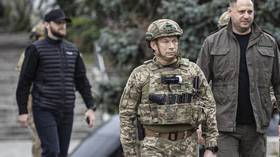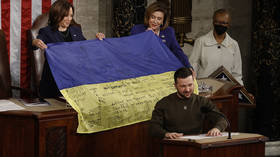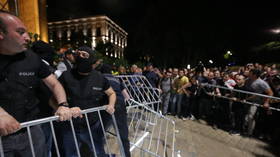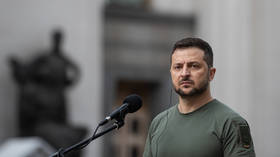“We cannot live with a nuclear Iran” – Arab diplomat
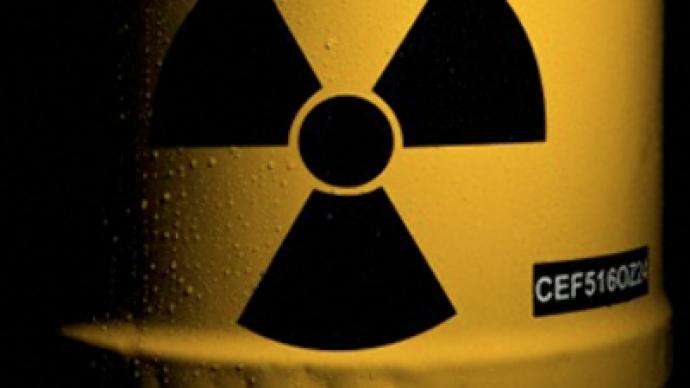
The United Arab Emirates ambassador to the United States said Tuesday that the benefits of a military strike against Iran's nuclear program would outweigh the short-term sacrifices.
With bluntness rarely observed in diplomatic circles, Ambassador Yousef al-Otaiba told a public forum that he supported the use of preemptive military force to knock out Iran's nascent nuclear program if sanctions fail to halt the Islamic republic’s alleged ambitions.
"I think it's a cost-benefit analysis," Mr. al-Otaiba commented. "I think despite the large amount of trade we do with Iran, which is close to $12 billion … there will be consequences, there will be a backlash and there will be problems with people protesting and rioting and very unhappy that there is an outside force attacking a Muslim country; that [protests are] going to happen no matter what."
“We cannot live with a nuclear Iran,” the ambassador told his audience.
Ambassador Yousef al-Otaiba’s comments were delivered on the very same day that Israeli Prime Minister Benjamin Netanyahu was meeting with US President in Washington in an effort to shore up international support against Iran, which many nations, including Israel and the United States, believe is in the process of developing a nuclear bomb under the guise of a civilian energy program.
Al-Otaiba gave his comments to Jeffrey Goldberg, a writer with The Atlantic magazine, during an interview session at the Aspen Ideas Festival in the US state of Colorado.
Greenberg wrote on the magazine’s webpage that, given the turbulent Arab-Persian history, he was not surprised with the ambassador’s comments, and even surmised that other Arab governments hold similar views.
“It is not only Israel that fears the rise of a nuclear Iran,” Goldberg wrote. “Arabs, if anything, fear such a development to a greater degree. The Jews and Arabs have been fighting for one hundred years. The Arabs and the Persians have been going at it for a thousand.”
He then speculated that the Arab world has more to worry about from a Persian bomb as opposed to a Jewish bomb.
“The idea of a group of Persian Shi'ites having possession of a nuclear bomb scares Arab leaders like nothing else – it certainly scares them more than the reality of the Jewish bomb,” Goldberg concluded.
Who is Yousef al-Otaiba?
Ambassador Yousef al-Otaiba, 37, has spent a large part of his life in the United States, where he graduated from Georgetown University in Washington DC, after graduating from Cairo American College.
He also attended the Industrial College of the US Armed Forces at the National Defense University in Washington DC as an International Fellow.
Al-Otaiba was sworn in as the UAE Ambassador to the United States on June 22, 2008.
About seven years before al-Otaiba was sworn in to his current post, he served as the Director of International Affairs at the court of Sheikh Mohammed bin Zayed, the Crown Prince of Abu Dhabi, also serving as his senior adviser.
In an article in The National, it was described how the young al-Otaiba “was one of the architects of President George W Bush's visit [in 2007], holding key meetings with the president's senior security advisers around his table in the health club cafeteria.”
The article went on to quote the newly appointed ambassador as he talked about the “stable and deep” relations that the UAE enjoys with Washington, using the example of Dubai’s purchase of top-shelf US fighter aircraft as proof.
"[The F-16 fighter jet] was more advanced even than the version the US uses,” al-Otaiba enthused. “Imagine the work that had to go through to allow the United States to release a fighter jet that is more advanced than the one they are flying.”
Some political commentators are already suggesting that al-Otaiba’s long-term affiliation with the United States has had a powerful influence on his political outlook, so many in the audience were not overly surprised by his tough comments on Iran.
John R. Bolton, the former US ambassador to the United Nations known for his hawkish, neoconservative affiliations, said the comments reflect the views of many Arab states in the Persian Gulf region that "recognize the threat posed by a nuclear Iran."
"They also know – and worry – that the Obama administration's policies will not stop Iran," he told The Washington Times in a separate interview.
But Bolton is no impartial observer to the events in the Middle East. Indeed, just last week he penned an article for The Washington Post (“Time for an Israeli Strike?”) in which he argues about the “compelling logic” of an Israeli strike on Iran.
“Accordingly, with no other timely option, the already compelling logic for an Israeli strike is nearly inexorable,” Bolton barked. “Israel is undoubtedly ratcheting forward its decision-making process. President Obama is almost certainly not.”
Clearly, this article was written with Netanyahu’s Washington visit in mind.
For anybody who believed they had heard the last war beat of the Bush-era neocons, the next several lines prove they are still in business, just waiting for the next big battlefield to swoop into.
“With regime change off the table for the coming critical period in Iran's nuclear program, Israel's decision on using force is both easier and more urgent,” the former US ambassador to the UN argued. “Since there is no likelihood that diplomacy will start or finish in time, or even progress far enough to make any real difference, there is no point waiting for negotiations to play out.”
Yet in contrast to Bolton’s assertions that the Obama administration policies “will not stop Iran,” White House officials, including Defense Secretary Robert M. Gates and Chairman of the Joint Chiefs of Staff Admiral Mike Mullen, have not ruled out the use of a pre-emptive military strike against the Islamic Republic.
But not everybody is so sure that a preemptive attack on Iran would be successful.
In the March/April issue of Foreign Affairs journal ("After Iran gets the Bomb"), James A. Lindsay and Ray Takeyh argue that "a successful military strike against Iran's nuclear facilities would delay Iran's program by only a few years, and it would almost certainly harden Tehran's determination to go nuclear."
The main foreign policy difference between the Bush administration and the Obama White House is that the latter has expressed its willingness to enter into "aggressive personal diplomacy" with Iran and other regional powers before any extreme measure is introduced. This may prove to be the best way of handling a wayward Iran. The Bush administration was far more inclined to strike first and ask questions later, which is one of the reasons that Iran seems so desperate to get nuclear weapons in the first place.
The brutal lesson of Saddam Hussein’s fall from power at the hands of US-led coalition forces has not been lost on Tehran: nuclear weapons make the perfect deterrent against “foreign aggression.”
Al-Otaiba warned that other Arab states in the Gulf would cultivate ties with Tehran if President Obama fails to stop the Islamic republic's nuclear ambitions.
"There are many countries in the region that if they lack assurance that the US is willing to confront Iran, they will start running for cover with Iran," he said. "Small, rich, vulnerable countries do not want to stick their finger in the big boy's eye if they do not have the backing of the United States."
“Countries in the region view the Iran threat very differently, I can only speak for the UAE, but talk of containment and deterrence really concerns me and makes me very nervous. Why should I be led to believe that deterrence or containment will work?” al-Otaiba is quoted as saying on The Atlantic’s website.
The ambassador concluded that his country would never accept a nuclear Iran.
"The United States may be able to live with it," he said. "We can't."


